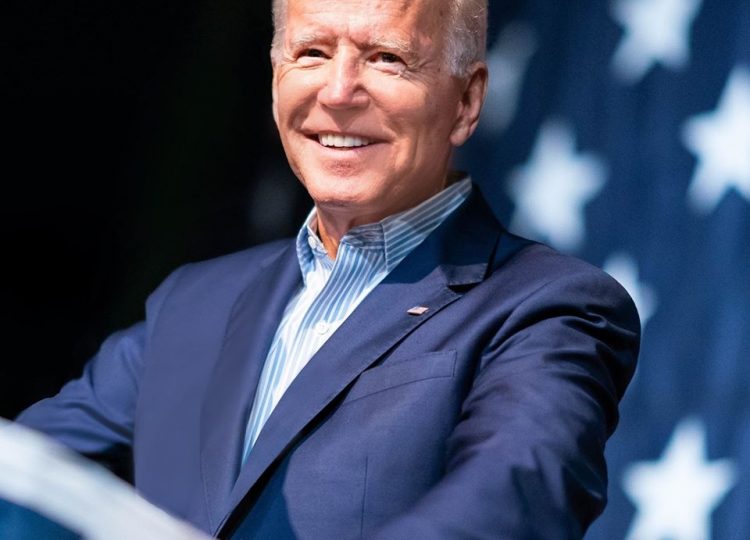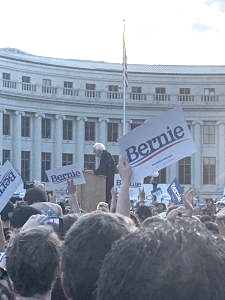
Western Leaders Call 2020 Presidential Policies On Fracking, Public Lands “Devastating”
By Erin Mundahl and Michael Sandoval
 A Democratic victory in November 2020 will herald the end of new oil and gas leases on public lands and the prospect of a ban on hydraulic fracturing, according to the policy outlines from the remaining candidates, and those positions drew heavy criticism from Western leaders ahead of Super Tuesday primaries.
A Democratic victory in November 2020 will herald the end of new oil and gas leases on public lands and the prospect of a ban on hydraulic fracturing, according to the policy outlines from the remaining candidates, and those positions drew heavy criticism from Western leaders ahead of Super Tuesday primaries.
Presidential candidate and U.S. Sen. Bernie Sanders has advocated for a complete ban on hydraulic fracturing or fracking, while other candidates like former Vice President Joe Biden and former Mayor Michael Bloomberg are calling for additional limits and reductions of the drilling technique.
Voters made their preferences known in states across the west like Colorado, Oklahoma, and Utah tonight, with California and Texas undecided going into overnight hours. Sanders is projected to win Colorado and Utah, while Biden led the field in Oklahoma.
In addition, the remaining Democratic candidates have called for a ban on all new oil and gas leasing on federally managed public lands. Meanwhile, Republicans representing these areas are making their support for industry known.
U.S. Rep. Scott Tipton serves Colorado’s natural resource-rich Western Slope and has supported projects like the Jordan Cove Liquefied Natural Gas (LNG) project. When asked about the prospects of any of the Democratic frontrunners’ policies, Tipton’s office was adamantly opposed.
“Congressman Tipton unequivocally opposes any across-the-board bans on hydraulic fracturing or oil and gas development, either on public or private lands. He has been a long supporter of responsible energy development and multiple-use of public lands,” said Liz Payne, Legislative Director for Tipton.
U.S. Sen. John Barrasso told Western Wire via email that, “[h]ydraulic fracturing is a principal reason America has created thousands of jobs, increased our energy security, and lowered energy costs for families and businesses.”
“For years, Wyoming and other western states have enforced the country’s most aggressive hydraulic fracturing regulations—regulations that also apply to federal lands within our borders. A fracking ban is unwarranted and will only hurt our growing economy and derail our path to energy dominance,” Barrasso added.
Fellow Republican Sen. John Enzi of Wyoming agrees, telling Western Wire he is “committed to keeping public lands open for outdoor recreation, tourism agricultural use, and where appropriate, energy development.”
“Senator Enzi believes rules to ban fracking on federal land would have a devastating effect on jobs and the economy in Wyoming,” Rachel Vliem, Enzi’s Press Secretary, told Western Wire. “He thinks each state should regulate based on what is best for its own residents. Wyoming already has carefully written regulations in place to ensure that energy production is done responsibly.”
U.S. Sen. Ted Cruz’s office referred Western Wire to a recent video produced by his office that sums up his arguments on maintaining the practice of fracking and the role it has played in reducing emissions.
“Fracking has become demonized. But fracking unlocked massive shale deposits of both natural gas and oils. Totally transformed the geo-political world. And in particular has resulted in an incredible shift from coal powered production to natural gas-powered production,” said Cruz in the video.
“Nothing – no socialist regulator, no Paris deal – nothing has had anywhere close to having an impact on carbon emissions as has a Texas oil man innovating fracking and moving away from coal to natural gas. I think that’s how we should address the environment through innovation that also produces jobs,” he continued.
The staff for Cruz’s counterpart, U.S. Sen. John Cornyn, pointed to tweets supporting energy on the senator’s account.
“One of the dumbest ideas to come out of D presidential primary yet, and that is saying something,” Cornyn tweeted last September, with a link to a Washington Free Beacon article on the potential impact of a fracking ban.
More recently, Cornyn tweeted about the lower prices of gasoline in Texas, saying, “Thank fracking.”
This attitude was shared by Rep. Kendra Horn of Oklahoma, who has vocally opposed a nationwide fracking ban and the Green New Deal because of the important role oil and gas have played in the Oklahoma economy.
““I do not support the proposed ban on fracking. The oil and gas industry has fueled economic development and new opportunities in Oklahoma since statehood,” said Horn, who instead advocates energy regulation that promotes affordability and safety.
“Our energy policies should be based on the facts and take a balanced approach to sustainability, job creation, conservation, and affordable energy for all Americans. Natural gas production is critical to American energy independence and is one of the most significant contributing factors in reducing greenhouse gas emissions in the United States,” she continued. “In Oklahoma, our state implemented new rules over the past four years that have made the industry safer and more sustainable. This is the kind of state-led, intentional approach we should take towards energy policy.”
However, the policy is radically different from the one shared by leading Democrats. Warren led with her plan to end new leasing last April at a rally in Aurora, Colo., unveiling her plan for public lands policies should she take the White House in 2020.
“I want to make you a promise—that is, on the first day of a Warren administration—on the first day, I will sign a moratorium that our public lands there will be no more new drilling or mining,” Warren said last year.
“It is wrong to prioritize corporate profits over the health and safety of our local communities. That’s why on my first day as president, I will sign an executive order that says no more drilling — a total moratorium on all new fossil fuel leases, including for drilling offshore and on public lands (emphasis in original),” Warren wrote in her policy brief.
In a September rally in Denver, Sanders also vowed “aggressive” and “far reaching” policies on oil and gas.
“I am extremely proud to tell you that I have recently introduced a proposal which is the most aggressive and far-reaching climate change proposal ever introduced by any presidential candidate. I am told by my opponents, and I’m told by people who represent the fossil fuel industry that our proposal is expensive. And you know what? It is expensive. But what is the alternative? We will not and we cannot sit back and allow this planet to be destroyed,” Sanders said.
While Biden stopped short of a total ban on fracking and has campaigned with former Obama Interior Secretary Ken Salazar, he did threaten to jail fossil fuel executives.
“Number two, holding them liable for what they have done,” he said in December 2019, “particularly in those cases where your underserved neighborhoods and – you know the deal, ok. And by the way, when they don’t want to deliver, put them in jail. I’m not joking about this.”
A fracking ban like those proposed by Warren and Sanders would likely have significant impacts on the economies of states in the Mountain West and across the country—many of them negative. According to a recent study by the American Petroleum Institute, a nationwide fracking ban would lead to 7.5 million lost jobs by 2022 and cut household incomes by $5,400 annually. These impacts would be especially cutting in states like New Mexico, which have burgeoning energy industries. Analysis from the U.S. Chamber of Commerce predicted that New Mexico would lose more than $86 billion in state economic development by 2025 if fracking were banned.
As the national platform moves to the left on energy issues, western Democrats are finding it tricky to balance their party’s goals with these economic realities.
In Colorado, former Governor John Hickenlooper (D) is finding his campaign for the Senate seat currently held by Cory Gardner hamstrung by his previous support for oil and gas. Hickenlooper has made the outdoors and natural resources the key focus of his campaign and has called for a halt on new leasing on public lands.
“If you look at most of the new leases, there aren’t that many good places to lease anyway,” Hickenlooper said last month. “I don’t have a problem saying, ‘On public lands, we shouldn’t do any additional leasing.’”
From westernwire.com